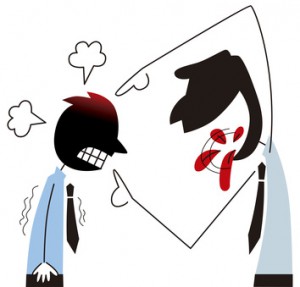The Impact of Discrimination on Teens
A rather disturbing study came out of the University of Southern California recently. The study followed 2,572 11th grade students from 10 public high schools in L.A. County for a year (2016-2017). These students were male and female: 47% Latino, 19% Asian, 4% African American, and 17% Caucasian. The study followed these students to explore the impact that public displays of discrimination (those seen in their neighborhoods as well as  those seen on TV) had on teens. At the start of the study, 26.7% of the teens were “very or extremely worried about societal discrimination.” At the end of the year, 34.7% of the students were “very or extremely worried about societal discrimination.” That’s disturbing…but it gets worse. The researchers also found “significant associations between increased level of concern about discrimination and six different adverse behavioral outcomes.” More specifically, “increasing societal discrimination was associated with higher frequency of substance use, greater number of different substances used, and 11% higher odds of depression and 12% greater odds of ADHD symptoms.” I find this even more disturbing when I watch the news and see the number of acts of discrimination reported. Somehow, we need to create a change for the sake of our most vulnerable children. That change can begin right in your family with these four tips.
those seen on TV) had on teens. At the start of the study, 26.7% of the teens were “very or extremely worried about societal discrimination.” At the end of the year, 34.7% of the students were “very or extremely worried about societal discrimination.” That’s disturbing…but it gets worse. The researchers also found “significant associations between increased level of concern about discrimination and six different adverse behavioral outcomes.” More specifically, “increasing societal discrimination was associated with higher frequency of substance use, greater number of different substances used, and 11% higher odds of depression and 12% greater odds of ADHD symptoms.” I find this even more disturbing when I watch the news and see the number of acts of discrimination reported. Somehow, we need to create a change for the sake of our most vulnerable children. That change can begin right in your family with these four tips.
- Build strong, intimate family relationships. Those strong family relationships become the model of relationship outside the home. In fact, studies have shown that a strong attachment leads to people acting less on their prejudices and showing greater kindness even to their enemies (You can read about it in one of my favorite studies pitting Hot Sauce Vs. the Power of Relationship).
- Don’t be afraid to talk about the acts of discrimination you or your children witness. As Mr. Rogers said, “Anything that’s human is mentionable, and anything that is mentionable can be more manageable. When we talk about our feelings, they become less overwhelming, less upsetting and less scary. The people we trust with that important talk can help us know that we’re not alone.” Don’t limit the talk to those who show discrimination. Teach your whole family to look for those who battle the discrimination. If I may quote Mr. Rogers again, “Look for the helpers. You will always find people who are helping.” Those are the people we want our children to emulate. Those are the heroes. Those are the ones who help us live courageously with the knowledge that, even in discrimination rears its ugly head, there are many who do not discriminate. There are many who share love, kindness, and hope.
- Find like-minded people, people who do not discriminate. Associate with people who love and share kindness with all people. In so doing, your children meet people from all walks of life and find human kindness resides in every corner of the world regardless of wealth, ethnicity, or gender.
- Build kindness into the fabric of your family. Start by being kind to one another (learn The Mighty Power of Kindness for Families in this short blog). Teach your children the joys of sharing kindness with others and the joy of humbly receiving kindness from others. Remember, “we live in a world in which we need to share responsibility. It’s easy to say, ‘It’s not my child, not my community, not my world, not my problem.’ Then there are those who see the need and respond. I consider those people my heroes” (Sorry, Mr. Rogers again). Teach your children to be the heroes. That can be as simple as visiting a nursing home or taking food to a friend who is grieving. (A Family Night to Share Kindness is a good place to start.)
Like I said, the study from USC disturbed me but then I started thinking of the study I’d like to see completed. In this study families would be strengthened. They would be coached to talk about their feelings and identify the helpers. They would be given opportunities to build bridges across our superficial differences and engage in family acts of kindness. Then, after a year, the study would measure their level of discrimination and their fear of discrimination. Would their fear go down? Would acting out behaviors go down? I dare say they would. Hey, why not run the experiment in your own home? You might be pleasantly surprised.
-0 Comment-